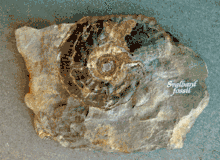fossil
English

A fossil.
Etymology
From French fossile, from Latin fossilis (“something which has been dug up”), from fodio (“I dig up”).
Noun
fossil (plural fossils)
- The mineralized remains of an animal or plant.
- (paleontology) Any preserved evidence of ancient life, including shells, imprints, burrows, coprolites, and organically-produced chemicals.
- 2012 March-April, John T. Jost, “Social Justice: Is It in Our Nature (and Our Future)?”, in American Scientist, volume 100, number 2, page 162:
- He draws eclectically on studies of baboons, descriptive anthropological accounts of hunter-gatherer societies and, in a few cases, the fossil record.
-
- (linguistics) A fossil word.
- (figuratively) Anything extremely old, extinct, or outdated.
Derived terms
Translations
The mineralized remains of an animal or plant
|
|
paleontology: any preserved evidence of ancient life
a fossilized term
anything extremely old, extinct, or outdated
- The translations below need to be checked and inserted above into the appropriate translation tables, removing any numbers. Numbers do not necessarily match those in definitions. See instructions at Wiktionary:Entry layout#Translations.
Translations to be checked
|
Danish
Inflection
| Inflection of fossil | |||
|---|---|---|---|
| Positive | Comparative | Superlative | |
| Common singular | fossil | — | —2 |
| Neuter singular | fossilt | — | —2 |
| Plural | fossile | — | —2 |
| Definite attributive1 | fossile | — | — |
| 1) When an adjective is applied predicatively to something definite, the corresponding "indefinite" form is used. 2) The "indefinite" superlatives may not be used attributively. | |||
Inflection
Declension of fossil
| neuter gender |
Singular | Plural | ||
|---|---|---|---|---|
| indefinite | definite | indefinite | definite | |
| nominative | fossil | fossilet | fossiler | fossilerne |
| genitive | fossils | fossilets | fossilers | fossilernes |
German
Declension
Declension of fossil
| number & gender | singular | plural | |||
|---|---|---|---|---|---|
| masculine | feminine | neuter | all genders | ||
| predicative | er ist fossil | sie ist fossil | es ist fossil | sie sind fossil | |
| strong declension (without article) |
nominative | fossiler | fossile | fossiles | fossile |
| genitive | fossilen | fossiler | fossilen | fossiler | |
| dative | fossilem | fossiler | fossilem | fossilen | |
| accusative | fossilen | fossile | fossiles | fossile | |
| weak declension (with definite article) |
nominative | der fossile | die fossile | das fossile | die fossilen |
| genitive | des fossilen | der fossilen | des fossilen | der fossilen | |
| dative | dem fossilen | der fossilen | dem fossilen | den fossilen | |
| accusative | den fossilen | die fossile | das fossile | die fossilen | |
| mixed declension (with indefinite article) |
nominative | ein fossiler | eine fossile | ein fossiles | (keine) fossilen |
| genitive | eines fossilen | einer fossilen | eines fossilen | (keiner) fossilen | |
| dative | einem fossilen | einer fossilen | einem fossilen | (keinen) fossilen | |
| accusative | einen fossilen | eine fossile | ein fossiles | (keine) fossilen | |
Norwegian Bokmål
Adjective
fossil (neuter singular fossilt, definite singular and plural fossile)
- fossilised (UK), fossilized, or fossil (noun modifier: e.g. fossil fuels)
Etymology 2
From New Latin [Term?]
Noun
fossil m or n (definite singular fossilen or fossilet, indefinite plural fossiler or fossil, definite plural fossilene or fossila)
- a fossil (fossilised remains of an animal or plant)
Derived terms
Norwegian Nynorsk
Adjective
fossil (neuter singular fossilt, definite singular and plural fossile)
- fossilised (UK), fossilized, or fossil (noun modifier)
Etymology 2
From New Latin
Swedish
Declension
| Inflection of fossil | |||
|---|---|---|---|
| Indefinite | Positive | Comparative | Superlative2 |
| Common singular | fossil | — | — |
| Neuter singular | fossilt | — | — |
| Plural | fossila | — | — |
| Definite | Positive | Comparative | Superlative |
| Masculine singular1 | fossile | — | — |
| All | fossila | — | — |
| 1) Only used, optionally, to refer to things whose natural gender is masculine. 2) The indefinite superlative forms are only used in the predicative. | |||
Declension
| Declension of fossil | ||||
|---|---|---|---|---|
| Singular | Plural | |||
| Indefinite | Definite | Indefinite | Definite | |
| Nominative | fossil | fossilet | fossil | fossilen |
| Genitive | fossils | fossilets | fossils | fossilens |
| Declension of fossil | ||||
|---|---|---|---|---|
| Singular | Plural | |||
| Indefinite | Definite | Indefinite | Definite | |
| Nominative | fossil | fossilet | fossiler | fossilerna |
| Genitive | fossils | fossilets | fossilers | fossilernas |
Related terms
- dinosauriefossil
- fossilbränsle
- fossilerad
- fossilförande
- fossilisation
- fossilisera
- fossilisering
References
- fossil in Svenska Akademiens ordlista över svenska språket (13th ed., online)
This article is issued from Wiktionary. The text is licensed under Creative Commons - Attribution - Sharealike. Additional terms may apply for the media files.